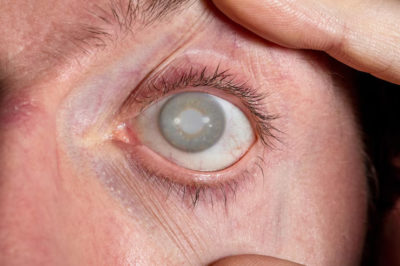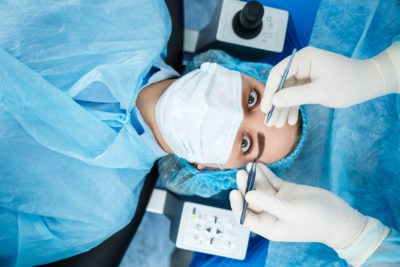Cataract surgery has become a life-changing procedure, restoring clear vision for millions of patients worldwide. However, some people experience side effects afterward, with light sensitivity—or photophobia—being one of the most common. This sensitivity can make daily activities challenging, especially when exposed to bright or fluorescent lights.
In this blog, we’ll address why cataract surgery light sensitivity occurs, discuss its duration, and provide strategies to manage discomfort from bright and fluorescent lights after cataract surgery. Understanding this process can help patients better navigate their recovery and reduce stress around light sensitivity.
Why Does Light Sensitivity Occur After Cataract Surgery?
Cataract surgery light sensitivity is quite common, as it stems from several factors linked to both the procedure and the healing process. During cataract surgery, the eye’s clouded natural lens is replaced with an artificial intraocular lens (IOL). Although highly effective, this change can make your eyes more sensitive to light while adjusting to the new lens.
Key Reasons Behind Light Sensitivity:
- Healing Process: The eye tissues around the newly placed lens need time to heal, which can heighten sensitivity to light.
- Increased Light Transmission: The artificial IOL allows more light to enter the eye compared to the cataract-clouded lens, leading to heightened sensitivity.
- Pupil Function: The surgery may temporarily impact how well the pupil responds to light, causing bright lights to feel intense or even painful.
What is photophobia? Meaning of photophobia and its common symptoms
Photophobia refers to sensitivity to light, where bright lights cause discomfort or pain in the eyes. It is not a disease but a symptom of underlying eye conditions or neurological issues. People with photophobia may find sunlight, fluorescent lights, or even screen glare unbearably bright, leading to discomfort or eye strain.
Meaning of Photophobia
The term “Photophobia” comes from two Greek words: “Photo” means light “Phobia” means fear or aversion. However, photophobia does not mean an actual fear of light but rather an increased sensitivity or intolerance to light exposure.
Common Symptoms of Photophobia
People experiencing photophobia may have one or more of the following symptoms:
- Eye Discomfort in Bright Light
Pain or irritation when exposed to sunlight, LED lights, or fluorescent bulbs.
Need to squint, close eyes, or wear sunglasses indoors. - Headache or Migraine Triggers
Bright lights can worsen migraines or tension headaches.
Increased sensitivity to artificial or natural light. - Watery or Red Eyes
Excessive tearing due to irritation from light exposure.
Redness and inflammation in the eyes. - Blurred Vision
Difficulty focusing due to light-induced discomfort.
Temporary visual disturbances or halos around lights. - Eye Strain and Fatigue
Feeling tired or discomforted after prolonged light exposure.
Burning or aching sensation in the eyes.
Common Causes of Photophobia
Photophobia can occur due to various medical conditions, including:
Dry eyes – Lack of moisture in the eyes can increase light sensitivity.
Migraines – Light is a common migraine trigger.
Eye infections (conjunctivitis, uveitis, keratitis) – Inflammation causes light sensitivity.
Corneal damage – Injuries or scratches on the cornea lead to discomfort in bright light.
Refractive errors – Uncorrected vision problems like myopia or astigmatism may contribute to photophobia.
Neurological conditions – Issues like meningitis, brain injuries, or excessive screen time can make the brain more sensitive to light.
How to Manage Photophobia?
Wear sunglasses with UV protection when outdoors.
Reduce screen brightness and use blue light filters.
Use artificial tears if dry eyes are the cause.
Stay in dimly lit environments if needed.
Consult an eye doctor if photophobia is persistent or severe.
Photophobia can significantly impact daily life, but identifying the cause and managing light exposure can help reduce discomfort and improve eye health.
Photophobia After Cataract Surgery: How Common Is It?
Photophobia after cataract surgery is common among patients. Although the level of sensitivity varies, most experience discomfort when exposed to bright lights and certain artificial light sources, such as fluorescent lights, during the initial recovery period.
Typical Duration of Light Sensitivity:
- First Few Days: During the early post-surgery period, light sensitivity may be intense, especially when exposed to direct or bright light sources.
- 2-6 Weeks Post-Surgery: As the eye heals, light sensitivity gradually decreases, though certain types of light may still cause discomfort.
- Beyond 6 Weeks: For most patients, sensitivity to light resolves by this time. However, if photophobia after cataract surgery persists, it’s important to consult with an ophthalmologist to rule out complications.
While photophobia after cataract surgery is generally temporary, a small percentage of patients may continue to experience sensitivity in the long term. Adjustments to light exposure and protective measures can often help mitigate this sensitivity and allow for a smoother transition.
Types of Light Sensitivity Patients Often Experience
Patients may find particular lighting conditions more bothersome than others, with sunlight and artificial lighting being the primary culprits. Below are the common scenarios:
1. Bright Lights After Cataract Surgery
Many patients notice heightened discomfort with bright lights after cataract surgery. This sensitivity, especially to direct sunlight, is one of the most frequently reported symptoms. Wearing sunglasses with strong UV protection can help significantly by reducing the intensity of light entering the eye.
2. Fluorescent Lights After Cataract Surgery
For some, fluorescent lights after cataract surgery can be challenging. Fluorescent lighting is often used in public spaces, offices, and hospitals, and it can strain sensitive eyes due to its flickering and sharp brightness. Specialized lenses that reduce glare and filter specific wavelengths can help make environments with fluorescent lighting more comfortable during recovery.
3. Screens and Digital Devices
Another common form of photophobia involves screens and digital devices. Blue light emitted from screens can exacerbate light sensitivity. Adjusting screen settings or using blue-light-blocking glasses can be effective in reducing discomfort.
Managing Light Sensitivity After Cataract Surgery
While dealing with cataract surgery light sensitivity can be frustrating, several techniques can help patients manage and reduce discomfort. Here are some practical tips:
Wear UV-Protective Sunglasses
Invest in high-quality sunglasses that block 100% of UV rays. This can shield your eyes from intense sunlight and reduce sensitivity when exposed to bright lights after cataract surgery. Wraparound sunglasses are especially useful because they limit light from the sides, providing enhanced comfort.
Opt for Soft Indoor Lighting
Avoid harsh fluorescent lights indoors, which can be challenging on sensitive eyes. Switch to softer or warm LED lighting at home when possible. Lower-watt bulbs, dimmers, or indirect lighting can also create a more comfortable environment.
Use Blue-Light Filters on Digital Devices
Blue light from phones, tablets, and computers can be irritating for those with photophobia after cataract surgery. Many devices have settings that allow you to reduce blue light emission, or you can purchase glasses designed to filter out blue light.
Follow the 20-20-20 Rule
Regular breaks from screens are essential to reduce strain on sensitive eyes. Follow the 20-20-20 rule: every 20 minutes, look at something 20 feet away for at least 20 seconds. This helps relax the eyes and prevent strain, especially under fluorescent lighting conditions.
Ask Your Doctor About Special Lenses
For those experiencing prolonged discomfort, your doctor may suggest photochromic lenses, which automatically adjust to light changes. These lenses can help mitigate the effects of both bright and fluorescent lights, providing a more balanced visual experience.
When to Seek Help for Light Sensitivity
While light sensitivity after cataract surgery typically improves within a few weeks, there are times when a doctor’s advice is necessary. Reach out to your ophthalmologist if you experience the following:
- Persistent Photophobia: If sensitivity to light lasts beyond six weeks, further evaluation can help determine the cause.
- Pain with Sensitivity: Light sensitivity coupled with pain, redness, or swelling could indicate a complication, such as infection.
- Visual Abnormalities: Symptoms like double vision, halos around lights, or difficulty seeing in low light should be reported, as they may indicate other issues needing attention.
Embracing Life with Renewed Vision
Though light sensitivity after cataract surgery can be an unexpected part of recovery, it usually subsides as the eye adjusts to the new lens. Patients can look forward to a clearer, brighter world once the photophobia diminishes. By taking simple precautions, like wearing UV-protective sunglasses and managing exposure to artificial light sources like fluorescent lights, patients can make their recovery period more comfortable.
Remember, whether you’re experiencing discomfort from bright lights after cataract surgery or find fluorescent lights after cataract surgery bothersome, light sensitivity is generally temporary and manageable. By giving your eyes time to heal and following your ophthalmologist’s guidance, you’ll soon enjoy the full benefits of improved vision, with a newfound clarity that makes the healing journey worth it.
When should one consult an eye doctor?
Regular eye check-ups are essential for maintaining good vision, but certain symptoms require immediate attention from an eye specialist (ophthalmologist). Ignoring eye problems can lead to serious complications, including vision loss. Here are the key situations when you should contact an eye doctor:
- Sudden or Severe Vision Changes
Blurred or distorted vision that appears suddenly.
Loss of peripheral (side) vision.
Seeing double (diplopia) or difficulty focusing. - Persistent Eye Pain or Discomfort
Sharp, stabbing, or throbbing pain in or around the eye.
Pain that does not go away with rest or over-the-counter remedies.
Sensitivity to light (photophobia) along with eye pain. - Redness, Swelling, or Eye Infections
Red, swollen, or irritated eyes for more than two days.
Pus or mucus discharge from the eyes.
Crusting of the eyelids, itching, or burning sensation. - Frequent Headaches or Eye Strain
Regular headaches after reading, screen use, or working in bright light.
Eye strain that does not improve with rest or reducing screen time.
Feeling pressure around the eyes or forehead. - Floaters, Flashes, or Dark Spots in Vision
Sudden appearance of floaters (black or gray spots moving in vision).
Flashes of light in one or both eyes.
A shadow or curtain over part of your vision (possible retinal detachment). - Difficulty Seeing at Night or Adjusting to Light
Trouble driving at night due to poor vision.
Difficulty adjusting from bright light to darkness.
Increased glare or halos around lights. - Changes in Eye Appearance
Drooping eyelids (ptosis).
One eye appears larger or smaller than the other.
Cloudy or white appearance in the pupil. - Diabetes, Hypertension, or Family History of Eye Diseases
People with diabetes should have regular eye exams to check for diabetic retinopathy.
High blood pressure can damage blood vessels in the eyes.
Family history of glaucoma, macular degeneration, or cataracts increases risk. - Injury or Foreign Object in the Eye
Any eye injury, blunt trauma, or chemical exposure requires immediate medical attention.
Feeling like something is stuck in the eye, but unable to remove it safely. - Need for Updated Prescription Glasses or Contact Lenses
Frequent squinting or difficulty reading small print.
Glasses or contact lenses no longer provide clear vision.
Increased eye fatigue or discomfort while using corrective lenses.
When to Seek Emergency Eye Care?
You should visit an eye doctor immediately if you experience:
Sudden vision loss in one or both eyes
Severe pain, redness, or swelling
Trauma, burns, or bleeding from the eye
Persistent floaters, flashes, or shadows in vision









